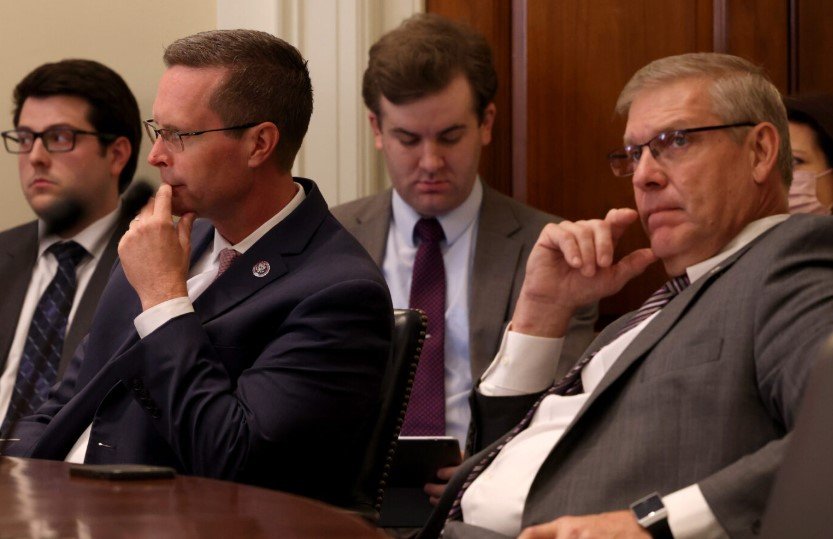Georgia’s U.S. Senate candidates met with business leaders in Columbus on August 20, 2025, to share their plans for the state’s economy amid growing worries over tariffs and trade. Incumbent Democrat Jon Ossoff and Republican challengers Mike Collins, Buddy Carter, and Derek Dooley highlighted their views on jobs, inflation, and global competition during the lively gathering.
Event Draws Key Players in 2026 Race
The meeting, hosted by local business groups, focused on how federal policies affect Georgia’s industries like manufacturing, agriculture, and tech. Over 200 attendees, including executives from small firms and large corporations, heard the candidates outline strategies to boost growth.
Ossoff, seeking re-election in 2026, stressed the need for stable trade rules to help Georgia exporters. He pointed to recent data showing the state’s economy grew by 2.8 percent in the second quarter of 2025, but warned that uncertainty from tariffs could slow that progress.
Republican candidates pushed for stronger protections for American workers. Carter, a congressman from Savannah, talked about his experience in pharmacy and how it shapes his views on healthcare costs tied to trade.
Collins, another congressman, emphasized voter turnout in Georgia, a swing state where economic issues often decide elections. Dooley, a former college football coach new to politics, called for fresh ideas to represent everyday Georgians.
The event came as polls show the 2026 Senate race tightening, with Ossoff leading by a slim margin in recent surveys from groups like Quinnipiac University.

Candidates Tackle Tariffs and Trade Concerns
Tariffs took center stage, with business leaders voicing fears about higher costs for imports. Georgia imports billions in goods yearly, and recent hikes have raised prices on everything from electronics to farm equipment.
Ossoff criticized broad tariffs as a tax on consumers that hurts small businesses. He referenced how similar policies in 2018 led to a 15 percent drop in Georgia soybean exports, according to state agriculture reports.
Carter argued for targeted tariffs to level the playing field against countries like China. He shared stories from coastal Georgia firms that lost jobs due to unfair competition.
Dooley, drawing from his coaching background, compared trade deals to team strategies, saying America needs to play offense to win back manufacturing jobs. Collins agreed, noting that Georgia’s textile industry could rebound with better protections.
Business owners at the event asked pointed questions about inflation, which hit 3.2 percent nationally in July 2025, per the Bureau of Labor Statistics. Candidates promised to fight rising costs through smarter policies.
Here are some key stances on tariffs from the candidates:
- Jon Ossoff: Opposes broad tariffs, calls them a burden on families and exporters.
- Buddy Carter: Supports selective tariffs to protect U.S. industries from foreign dumping.
- Mike Collins: Favors tariffs that encourage domestic production and job growth.
- Derek Dooley: Advocates for tariffs as a tool to rebuild American manufacturing strength.
Economic Visions for Georgia’s Future
Looking ahead, the candidates painted different pictures of Georgia’s economy by 2030. Ossoff highlighted investments in infrastructure, like the $1.2 billion in federal funds for Georgia ports in 2025, which created over 5,000 jobs.
Republicans focused on reducing regulations to spark innovation. Carter mentioned his work on bills to cut red tape for energy firms, aiming to lower utility costs for businesses.
Dooley, leveraging his outsider status, proposed tax breaks for startups in rural areas, where unemployment remains above the national average of 4.1 percent as of August 2025.
Collins tied economic success to border security, arguing that uncontrolled immigration strains resources and drives up wages in key sectors.
Attendees appreciated the direct access. One local manufacturer said the discussion helped clarify how Senate votes could impact supply chains disrupted by global events like the ongoing trade tensions with Europe.
Broader Impacts on Businesses and Voters
The Columbus event reflects wider trends in the 2026 midterms, where economic issues dominate. Georgia’s diverse economy, from Atlanta’s tech hubs to rural farms, makes it a bellwether for national debates.
Recent studies from the U.S. Chamber of Commerce show that 68 percent of small business owners worry about trade wars escalating costs. In Georgia, this hits hard in sectors like poultry and peanuts, which export $4 billion annually.
Candidates also touched on workforce development. Ossoff promoted apprenticeships, while Republicans called for more vocational training tied to local needs.
| Candidate | Party | Key Economic Priority | Stance on Tariffs |
|---|---|---|---|
| Jon Ossoff | Democrat | Infrastructure investment | Against broad tariffs |
| Buddy Carter | Republican | Regulatory relief | For targeted tariffs |
| Mike Collins | Republican | Job protection | Supports protective tariffs |
| Derek Dooley | Republican | Startup incentives | Favors rebuilding manufacturing |
This table sums up the main differences, based on their statements at the event.
Voters in Columbus, a city with a strong military and manufacturing base, see the race as crucial for local growth. With early voting set to start in October 2026, these discussions could sway undecided groups.
Challenges Ahead in a Tight Race
As the campaign heats up, challenges remain. Ossoff faces criticism over national inflation rates, even as Georgia outperforms many states. Republicans must unify behind one candidate in a potential primary.
Dooley’s entry adds intrigue, with his sports fame drawing crowds but raising questions about his policy depth. Carter and Collins bring congressional experience, appealing to establishment voters.
The event underscored unity on one point: Georgia needs leaders who prioritize business stability. With the state’s GDP reaching $700 billion in 2024, up 4 percent from the prior year, the stakes are high.
Business leaders left with mixed feelings, hopeful for action but wary of political gridlock in Washington.
What do you think about the candidates’ plans? Share your thoughts in the comments below and pass this article along to friends interested in Georgia politics.
